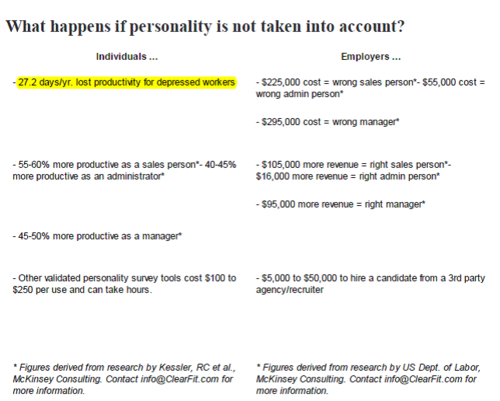Employers and assessment providers have tried to distinguish their assessments by arguing that their assessments were designed to measure “normal” personalities and/or “stable” personality traits. That argument fails because the FFM measures both sides of the same coin. As noted in the ADA, FFM and DSM post, the five-factor model of personality is widely accepted as representing the higher-order structure of both normal and abnormal personality traits.
By its design, a test that measures so-called “normal” personalities and seeks to identify individuals with “stable personality traits” screens out (or reveals) persons who may not possess “normal” personalities and/or “stable” personality traits – persons like military veterans suffering from post-traumatic stress disorder, college students diagnosed with bipolar disorder and mothers with post-partum depression – persons whom the ADA was enacted (and amended) to protect.

The issue is whether the test is “designed to reveal” an impairment of physical or mental health. For example, one may devise a process to separate white beads from a container of red, white and blue beads. While the intent is to find the white beads, the process is designed to reveal red and blue beads by distinguishing them from white beads.
Similarly, an employment assessment is designed to reveal a person with a mental impairment (a red or blue bead) by distinguishing that person from a “normal” person (a white bead).
In the words of the Karraker court (please see the Courts Find Tests to be Illegal post), an employment assessment utilizing an FFM-based model is “designed, at least in part, to reveal mental illness and has the effect of hurting the employment prospects of one with a mental disability” and, as such, “is best categorized as a medical examination.”
Some assessment companies make it very clear that their tests are designed to identify and exclude persons with mental illnesses. Clearfit advertises itself as a “hiring tool for finding job applicants and predicting who will succeed.” According to the company’s website, “each applicant is scored against a Success Profile: a combination of personality and motivation traits that predict success in a particular role.”
And what happens if personality is not taken into account? According to Clearfit, one of the consequences is “27.2 days/yr. lost productivity for depressed workers.” Thus making it clear that the personality assessment should be used to eliminate from employment consideration those persons suffering from a mental illness, like mothers with post-partum depression.
A screenshot from the Clearfit webpage is set out below:



No comments:
Post a Comment
Because I value your thoughtful opinions, I encourage you to add a comment to this discussion. Don't be offended if I edit your comments for clarity or to keep out questionable matters, however, and I may even delete off-topic comments.